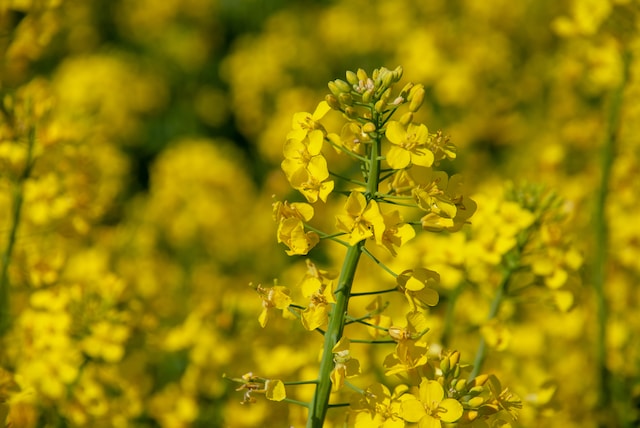Mustard oil, derived from the seeds of the mustard plant, has been used for centuries in various cultures for its numerous health and beauty benefits. This versatile ingredient not only adds a distinct flavor to culinary delights but also offers several advantages for skincare, haircare, and overall health.
In this comprehensive guide, we will explore the various uses and benefits of mustard oil and provide practical tips for incorporating it into your daily routine.
Mustard Oil for Skincare
Mustard oil has been used for centuries in skincare routines due to its nourishing and therapeutic properties. It is rich in essential fatty acids, vitamins, and antioxidants, making it beneficial for various skin concerns. Here are some ways you can incorporate mustard oil into your skincare routine:
Cleansing:
It can be used as a natural cleanser to remove dirt, impurities, and makeup. Massage a small amount of oil onto your face and neck, allowing it to dissolve the impurities. Rinse with warm water and pat dry. This method helps retain moisture and leaves your skin feeling clean and hydrated.
Moisturizer:
Its is an excellent natural moisturizer, especially for dry or mature skin. After cleansing, apply a few drops of mustard oil to your face and massage gently. It helps nourish the skin, restores moisture, and reduces dryness and flakiness. For extra hydration, mix a few drops of mustard oil with your regular moisturizer.
Anti-Aging:
The antioxidants present in mustard oil help combat free radicals and protect the skin from oxidative stress. Regular application can help reduce the appearance of fine lines, wrinkles, and other signs of aging. Massage this oil onto your face and neck in upward circular motions to promote blood circulation and firmness.
Treating Skin Conditions:
Mustard oil possesses antimicrobial and anti-inflammatory properties, making it useful for treating various skin conditions such as acne, eczema, and psoriasis. Apply a small amount of oil directly to the affected area and leave it on for a few hours or overnight before rinsing off. It can help soothe inflammation, reduce redness, and promote healing.
Lip Care:
It works wonders for dry and chapped lips. Apply a drop of mustard oil to your lips and gently massage it in. It helps moisturize, soften, and repair the delicate skin on your lips.
Massage Oil:
Mustard oil’s smooth texture and therapeutic properties make it an excellent choice for body massages. Warm the oil slightly and apply it all over your body. Massage in circular motions to relax the muscles, improve blood circulation, and promote overall skin health.
Patch Test:
Before using It on your face or body, it’s essential to perform a patch test. Apply a small amount of oil on the inside of your wrist or elbow and wait for 24 hours to check for any allergic reactions or sensitivities.
Note: It’s crucial to choose high-quality, organic, cold-pressed mustard oil for skincare purposes. Avoid using mustard oil if you have sensitive or acne-prone skin, as it may cause irritation or clog pores. You can stop using if you experience any adverse reactions.
Incorporating mustard oil into your skincare routine can provide nourishment, hydration, and various benefits for your skin. However, it’s essential to listen to your skin’s needs and consult with a dermatologist if you have any specific skin concerns or conditions.

Mustard Oil for Haircare
Mustard oil is a versatile ingredient that offers several benefits for haircare. It contains essential nutrients, vitamins, and fatty acids that nourish the scalp, strengthen the hair follicles, and promote healthy hair growth.
Hair Growth and Strength:
Mustard oil stimulates blood circulation in the scalp, which promotes hair growth. It also helps strengthen the hair follicles, reducing hair breakage and hair loss. Warm a few tablespoons of mustard oil and massage it into your scalp for 15-20 minutes. Leave it on for an additional 30 minutes or overnight before shampooing your hair.
Dandruff Treatment:
The antifungal and antibacterial properties of this oil make it effective in combating dandruff. Mix equal parts of mustard oil and lemon juice and apply the mixture to your scalp. Massage gently and leave it on for 30 minutes before washing your hair. Regular use can help reduce flakiness and itchiness associated with dandruff.
Deep Conditioning Treatment:
It can serve as an excellent deep conditioning treatment for dry and damaged hair. Warm the oil and apply it generously to your hair, focusing on the ends. Cover your hair with a shower cap and leave the oil on overnight. In the morning, wash your hair with a mild shampoo.
Split End Repair:
It can help reduce the appearance of split ends and prevent further damage. Apply a small amount of mustard oil to the ends of your hair regularly. It helps seal the cuticles, preventing moisture loss and minimizing split ends.
Scalp Health:
Regular use of mustard oil on the scalp can help maintain a healthy scalp environment. It moisturizes the scalp, reduces dryness, and soothes itchiness. Massage warm oil into your scalp in circular motions for a few minutes before washing your hair.
Hair Mask Enhancer:
You can enhance the effectiveness of your hair masks by adding a few drops of mustard oil to them. Mix the oil with your preferred hair mask ingredients and apply the mixture to your hair. This combination helps boost the nourishing and conditioning effects of the mask.
Protects from UV Damage:
Mustard oil acts as a natural sunscreen for your hair, protecting it from the harmful effects of UV rays. Before going out in the sun, apply a small amount of oil to your hair for added protection.
Remember to choose cold-pressed, organic mustard oil for best results. Perform a patch test before using it on your scalp to check for any allergies or sensitivities. Additionally, if you have oily hair or a sensitive scalp, use mustard oil in moderation and focus the application on the hair shafts rather than the scalp.
However, if you have any specific hair concerns or conditions, it’s advisable to consult with a trichologist or dermatologist for personalized advice and recommendations.
Mustard Oil in Recipes
Mustard oil is a versatile cooking oil that adds a distinct flavor and aroma to various dishes. It is commonly used in Indian, Bengali, and other regional cuisines.
Cooking Medium:
Mustard oil can be used as a cooking medium for sautéing, frying, or stir-frying. However, it is important to heat mustard oil until it reaches its smoking point before adding ingredients to reduce its pungency and bitterness.
Flavoring Curries and Gravies:
Mustard oil adds a unique and pungent flavor to curries and gravies. Heat a small amount of mustard oil in a pan, add your choice of spices, and sauté them before adding other ingredients. This step enhances the flavor profile of the dish and gives it a distinct taste.
Marinades and Pickling:
It is an excellent base for marinades and pickling liquids. Its strong flavor complements various ingredients and helps infuse flavors into meats, vegetables, or even fruits. Mix mustard oil with spices, herbs, vinegar, or lemon juice to create delicious marinades for grilling or pickling vegetables.
Salad Dressings and Dips:
It can be used in salad dressings and dips to add a tangy and zesty flavor. Combine mustard oil with vinegar, lemon juice, honey, and herbs to create flavorful dressings for salads or drizzle it over roasted vegetables. It can also be used as a dip for bread or paired with yogurt and spices to make delicious dips.
Seasoning Tadka/Tempering:
It is commonly used for tempering or tadka in Indian cuisine. Heat mustard oil, add whole spices like cumin seeds, mustard seeds, or fenugreek seeds, and let them splutter. This tadka can be added to dal (lentil) dishes, vegetable curries, or even rice dishes to enhance their taste and aroma.
Baking:
In some recipes, it can be used as a substitute for other oils or fats in baking. However, due to its strong flavor, it is best suited for savory baked goods like bread, biscuits, or savory muffins.
Note on Moderation:
It has a distinct and strong flavor, so it’s important to use it in moderation to avoid overpowering other ingredients. Start with small quantities and adjust according to your taste preferences.
When using mustard oil in recipes, ensure that you choose high-quality, food-grade mustard oil that is specifically labeled for culinary use. Store it in a cool, dark place to maintain its freshness and flavor.
Remember, individual preferences may vary, and it’s always a good idea to experiment with different quantities and combinations to find the right balance of flavors in your recipes. Enjoy the unique taste and aroma that mustard oil brings to your culinary creations!
Conclusion
It is a versatile ingredient that offers numerous benefits for skincare, haircare, recipes, and overall health. It is rich in essential fatty acids, vitamins, antioxidants, and possesses antimicrobial and anti-inflammatory properties. Here’s a summary of what we covered in this comprehensive guide:
For Skincare:
This oil can be used as a natural cleanser, moisturizer, and skin nourisher.
It helps reduce dryness, flakiness, and signs of aging.
It is beneficial for treating skin conditions such as acne, eczema, and psoriasis.
For Haircare:
It is stimulates hair growth, strengthens hair follicles, and reduces hair breakage.
It can be used to combat dandruff and provide deep conditioning to dry and damaged hair.
It promotes scalp health and can be used to repair split ends.
In Recipes:
It adds a distinct flavor and aroma to dishes.
It can be used as a cooking medium, in curries, gravies, marinades, and pickling liquids.
It enhances salad dressings, dips, and can be used for tempering or tadka in Indian cuisine.
For Health:
It supports cardiovascular health by lowering cholesterol levels.
It possesses anti-inflammatory properties and aids in digestion.
Remember to choose high-quality, organic, cold-pressed this oil for best results and perform a patch test before using it on your skin or hair. Additionally, it’s important to use this oil in moderation and listen to your body’s needs.


